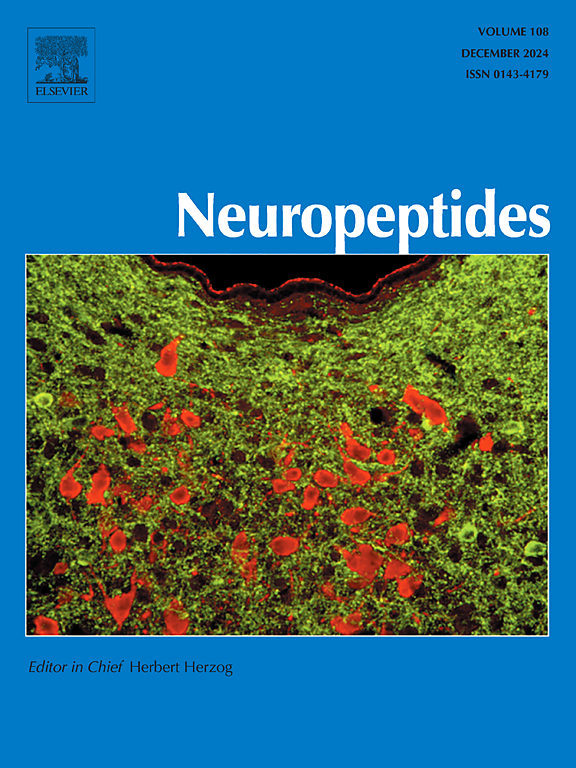Luteolin ameliorates kainic acid-induced seizure by modulating GADD45B and reducing oxidative stress in hippocampal neurons
IF 2.7
3区 医学
Q3 ENDOCRINOLOGY & METABOLISM
引用次数: 0
Abstract
Epilepsy is a prevalent neurological disorder impacting numerous people. However, existing anti-seizure medications frequently fall short of adequately managing seizures, highlighting the urgent need for the development of novel therapeutic interventions. This study investigates the neuroprotective effects of luteolin, which is a bioactive compound derived from the traditional Chinese medicine Danshen, on kainic acid (KA)-induced seizure in mice. Network pharmacology analysis identified GADD45B as a key target gene involved in acute epileptic seizure, which is modulated by luteolin. In vivo experiments demonstrated that luteolin significantly reduces seizure severity, frequency, and duration dose-dependently. Histological analyses revealed that luteolin preserves neuronal integrity and reduces hippocampal damage. Moreover, luteolin inhibited neuronal apoptosis and inflammation in KA-induced seizure mice by inhibiting MAPK and NF-κB signaling pathways. Furthermore, luteolin was shown to decrease oxidative stress and apoptosis in glutamate-induced HT22 hippocampal neuronal cells. Molecular docking showed that luteolin can bind with its target protein GADD45B in a good bond by intermolecular force. These neuroprotective effects of luteolin are mediated by the upregulation of GADD45B, which was further confirmed through knockdown experiments that GADD45B knockdown attenuated luteolin's protective actions. The findings suggest that luteolin exerts its therapeutic effects by modulating oxidative stress and apoptosis through GADD45B, offering potential as a novel neuroprotective strategy for seizures.
木草素通过调节GADD45B和减少海马神经元氧化应激来改善卡因酸诱导的癫痫发作
癫痫是一种影响许多人的普遍神经系统疾病。然而,现有的抗癫痫药物往往不能充分控制癫痫发作,突出了迫切需要开发新的治疗干预措施。本研究探讨了中药丹参中提取的生物活性化合物木犀草素对kainic acid (KA)诱导的小鼠癫痫发作的神经保护作用。网络药理学分析发现GADD45B是参与急性癫痫发作的关键靶基因,木草素可调节该基因的表达。体内实验证明木犀草素可显著降低癫痫发作的严重程度、频率和持续时间,且呈剂量依赖性。组织学分析显示木犀草素可保持神经元完整性,减轻海马损伤。此外,木贼素通过抑制MAPK和NF-κB信号通路抑制ka诱导癫痫小鼠的神经元凋亡和炎症。此外,木犀草素可降低谷氨酸诱导的HT22海马神经元细胞的氧化应激和凋亡。分子对接表明木犀草素可以通过分子间作用力与靶蛋白GADD45B形成良好的结合。木犀草素的这些神经保护作用是通过上调GADD45B介导的,通过敲低实验进一步证实,GADD45B的敲低减弱了木犀草素的保护作用。研究结果表明木犀草素通过GADD45B调节氧化应激和细胞凋亡发挥其治疗作用,为癫痫发作提供了一种新的神经保护策略。
本文章由计算机程序翻译,如有差异,请以英文原文为准。
求助全文
约1分钟内获得全文
求助全文
来源期刊

Neuropeptides
医学-内分泌学与代谢
CiteScore
5.40
自引率
6.90%
发文量
55
审稿时长
>12 weeks
期刊介绍:
The aim of Neuropeptides is the rapid publication of original research and review articles, dealing with the structure, distribution, actions and functions of peptides in the central and peripheral nervous systems. The explosion of research activity in this field has led to the identification of numerous naturally occurring endogenous peptides which act as neurotransmitters, neuromodulators, or trophic factors, to mediate nervous system functions. Increasing numbers of non-peptide ligands of neuropeptide receptors have been developed, which act as agonists or antagonists in peptidergic systems.
The journal provides a unique opportunity of integrating the many disciplines involved in all neuropeptide research. The journal publishes articles on all aspects of the neuropeptide field, with particular emphasis on gene regulation of peptide expression, peptide receptor subtypes, transgenic and knockout mice with mutations in genes for neuropeptides and peptide receptors, neuroanatomy, physiology, behaviour, neurotrophic factors, preclinical drug evaluation, clinical studies, and clinical trials.
 求助内容:
求助内容: 应助结果提醒方式:
应助结果提醒方式:


